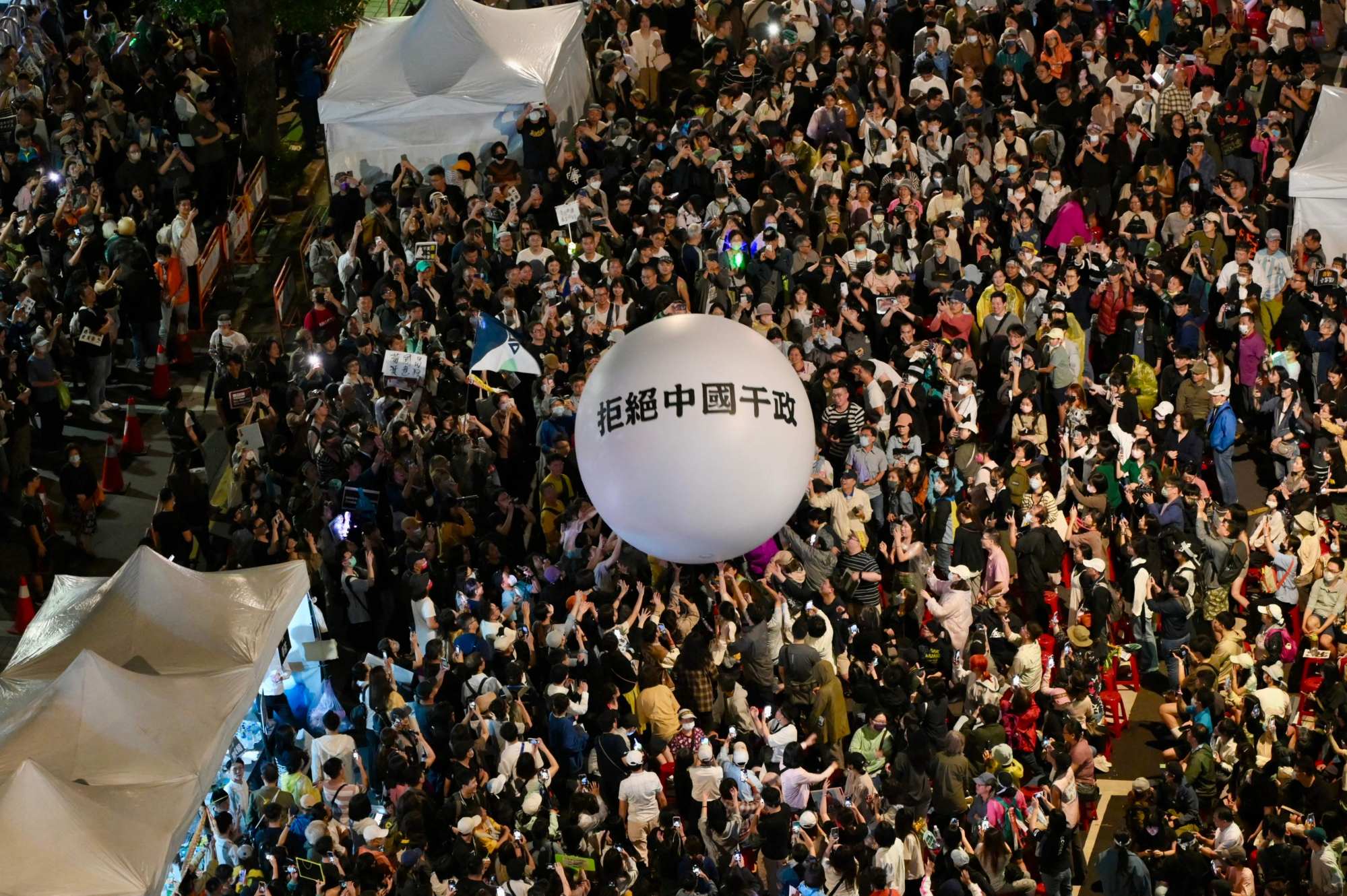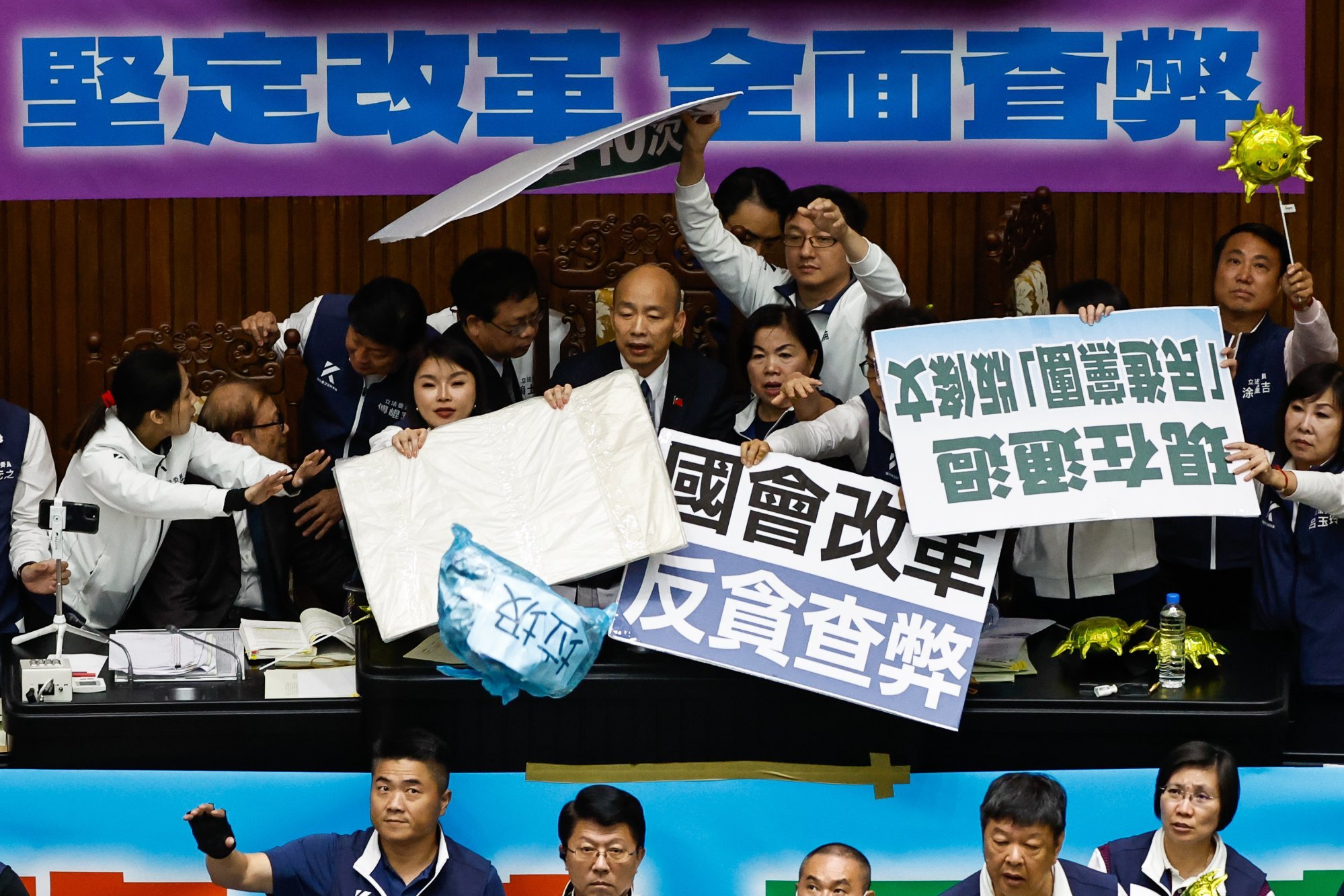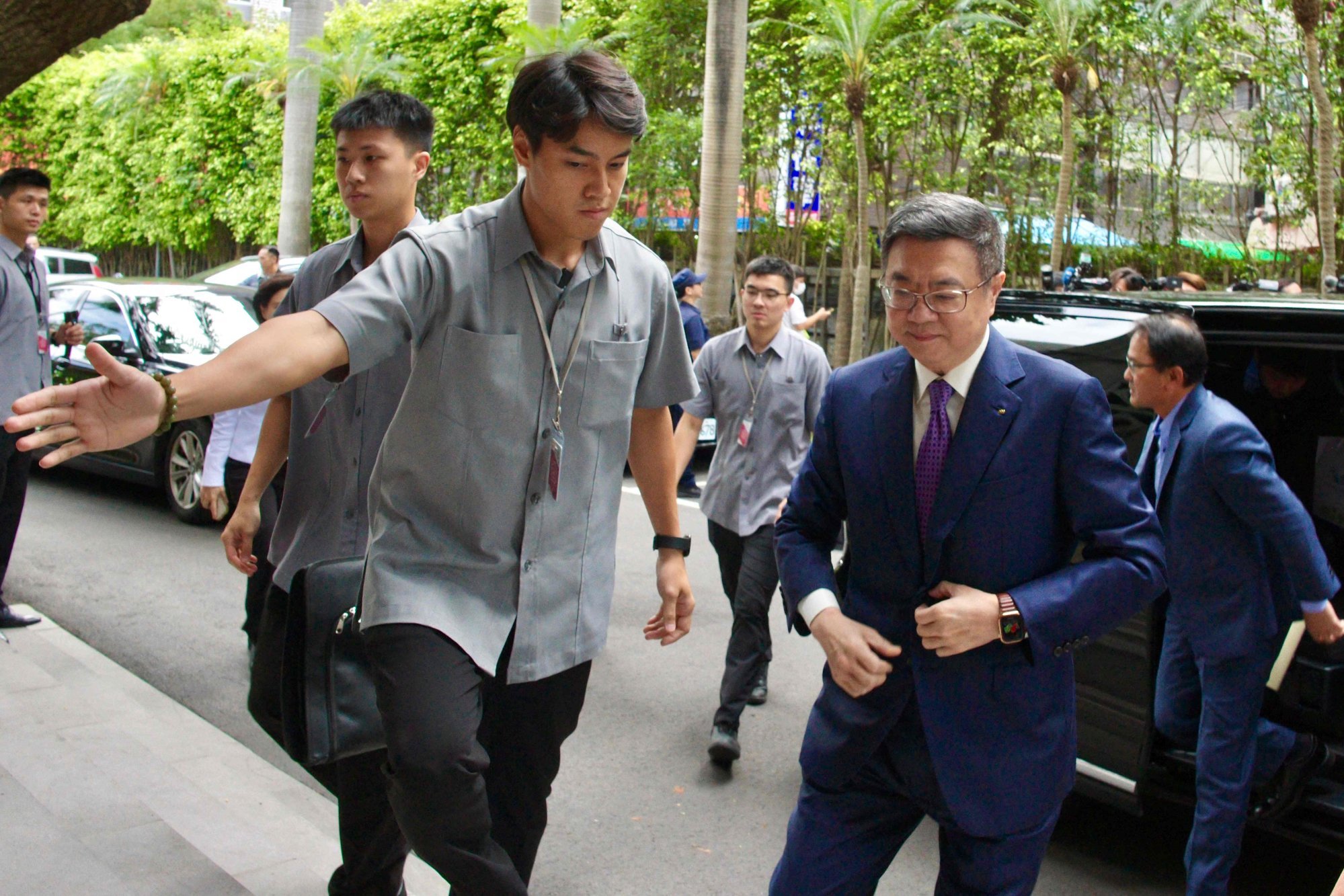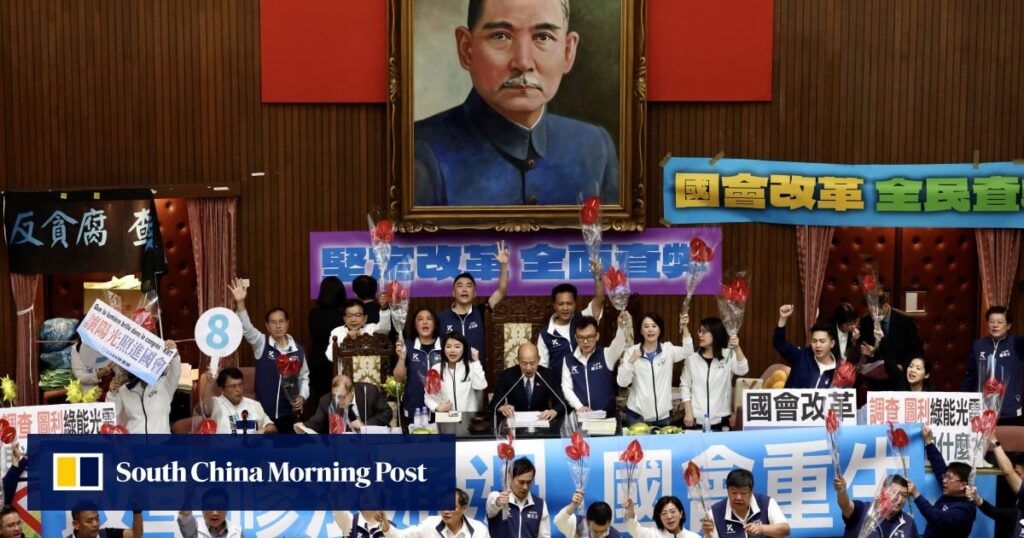The opposition bill includes measures including expanding lawmakers' investigative powers, bringing Taiwan's legislature closer to an oversight role similar to that of the U.S. Congress.
The new law makes “contempt of the legislature” a crime, with fines of up to NT$200,000 (US$6,170).
This makes it a criminal offence for any public servant or official who makes a false statement at a public hearing or when questioned by a member of parliament on a significant matter.
The Legislature also gained the power to request information and relevant documents from government agencies, the military, corporations, organizations and other relevant individuals, with failure to comply, delayed responses or deliberate concealment of relevant information subject to fines of up to NT$100,000 (US$3,000).
The new law requires the president to deliver an annual state of the island address and answer questions from lawmakers by March 1. It also requires appointments to key government posts to be held by open ballot.
Each stage of the bill's passage was marked by protests inside and outside parliament by DPP lawmakers, who criticised the bill as an “abuse of power” and a “serious breach of the constitution”.
On Tuesday, thousands of DPP supporters rallied outside parliament to blast opposition lawmakers for ramming through the bill, accusing them of “black box manipulation” without scrutinizing the bill point by point.

Protesters have accused the opposition of acting on instructions from mainland China to undermine Taiwan's democracy and criticise Lai's government.
“We cannot allow the Chinese Communist Party to manipulate parliament to undermine Taiwan,” Robert Cao Xingcheng, former founder of chip maker United Microelectronics and a vocal critic of Beijing, said during the protest.
Cao cited his visit to Beijing in April, where he met with Wang Huning, head of mainland China's top political advisory body, to claim that Kuomintang official Fu Kunhuun had submitted the bill at the direction of mainland Chinese authorities.
According to Cao, the “Exploitation of Power Bill” is aimed at reining in Lai and “reprimanding the government”.
China has called Lai a “staunch separatist” and warned that his leadership could spark conflict in Taiwan, which it has vowed to keep under mainland control, by force if necessary.
Lai's inaugural speech provoked a strong reaction from Beijing, which saw it as saturated with pro-independence sentiment, a red line that mainland China's leadership must not cross.
Most countries, including the United States, Taiwan's main arms supplier, do not recognise it as an independent country, but Washington strongly opposes any attempt to seize the island by force.

In a statement on Wednesday, the KMT stressed that the legislative reforms are “100 percent Taiwan's internal affairs” and aim to uphold the democratic process of checks and balances between the executive and legislative branches.
The statement emphasized that the DPP had advocated for reform while in opposition.
He also stressed that the scrutiny process “involved comprehensive and lawful bill scrutiny procedures.” [which] “We provide a guaranteed legal process and a system of judicial remedies in the interest of the people.”
Kuomintang spokesman Yang Qiyu said accusations the reforms were “favorable to the Chinese Communist Party and limit the power of the president and the executive branch in the interests of mainland China” were “absurd”.
Cho Yong-tai, Lai's designated prime minister and who also appoints and leads the Cabinet, which implements the prime minister's policies and proposes legislation, reiterated the Cabinet's intention on Thursday to send the bill back to parliament for reconsideration.
DPP lawmakers have said they will ask the grand justices of Taiwan's Constitutional Court to rule on whether the bills violate the constitution, which does not require the chief executive to address parliament or answer questions.
The DPP argues that under Taiwan's constitution, the power to investigate the government and officials lies not with the legislature but with the Control Yuan, Taiwan's top ombudsman with the powers of impeachment, accountability and audit.

Analysts warned that passing the bill would create a rift in Parliament, disrupting its functioning as well as blocking the government's budget review and progress on legislative measures sought by the Rai administration.
Huang Hui-hua, senior research fellow at the Taiwan Institute for International Strategic Studies, a Taipei-based think tank, noted that Foreign Minister Lam Ka-lung was among the DPP lawmakers who proposed similar reforms when the party was in opposition in 2012.
She said it would be “difficult” to justify opposition to the reform bill, especially given that the DPP had previously advocated for similar reforms.
“With no party holding an absolute majority, a divided parliament is inevitable.”
Huang said unlike the days when the DPP held a majority and could easily pass bills, he expects there to be occasional conflicts over specific bills that the Lai administration wants to pass or reject.
James Yifan Chen, a professor of foreign affairs and international relations at Tamkang University in New Taipei City, said that for the government to run smoothly, Lai and the DPP should learn to respect and compromise with the opposition.
“The KMT-TPP coalition's passage of the Legislative Reform Bill in the Legislative Yuan means that this newly elected parliament is reflecting the public's demand for more oversight over the executive branch.”
“There should be mutual respect for mainstream opinions,” said Lai, who also serves as chairman of the DPP, after his party received just 40.5 percent of the vote in January's presidential election.
Chen said the cabinet could veto a bill by sending it back to parliament for reconsideration, but such a step would be ineffective because the DPP is in the minority.
If Cho vetoes the bill, “lawmakers can vote to override the veto with a simple majority, but the opposition has enough votes to secure it,” he said. If the veto request is overturned, Cho, who has only been in office for 10 days, would be forced to comply with the veto or resign, according to the rules.
“The only way the Rai government can get around the bill is to ask the Constitutional Court for an interpretation. [they] While Chen said “whether it violates the constitution or not is irrelevant,” he warned that any such move would “have a negative impact on the relationship between the executive and the legislative branches.”
Analysts have dismissed claims that the reform bill is part of a plan by Beijing to derail parliament and undermine Lai's government as unrealistic.
“These bills are mostly learned from and even copied from the US Congress. Unless the US Congress also promotes China's control, such accusations are unreasonable and lack a true understanding of the context of these bills,” Chen said.
“By doing their jobs well, the KMT and the TPP will show Taiwanese voters who is always making excuses for China,” he added.
Huang believes the focus has not been on the reform bill. “The problem lies in procedural issues and the moral failings of the KMT and TPP legislative representative Huang Kuo-chang, which have led to public discontent,” he said.
Huang had previously been seen as an ally of the DPP, but disgruntled DPP supporters have singled him out in recent protests after he left the strongly pro-independence New Power Party, of which he was leader, to join the TPP.
“The protests have also highlighted the deep distrust that their supporters have for the KMT. Anything related to the KMT, rightly or wrongly, will provoke their anger,” Huang said.
She also pointed to the cumulative impact of KMT official Fu's visit to Beijing in April, the People's Liberation Army's military exercises simulating a blockade of the island in response to Lai's inaugural speech, and the legislative showdown.
“[These] All of this now has a Chinese element added to it,” Huang said.
Adding to Lai's troubles with the legislature are allegations that the DPP used mobile phone signal data to spy on protesters, adding fuel to a political storm sweeping the government.
DPP policy director Wang Yichuan said on a political talk show on Tuesday that through the data, they were able to distinguish the political leanings and ages of people who took part in recent protests in front of the legislature.
Wang said the crowd could be compared to those attending an election rally in January and a TPP event on May 19. His remarks sparked strong public outcry and calls for accountability.
“This incident has brought a new political storm to the dawn of the dawn government. It will now have to explain whether it did such a thing,” said Ho Chih-yung, a professor of general education at National Tsing Hua University in Hsinchu, south of Taipei.
“What is most embarrassing is that the DPP has consistently criticized mainland Chinese authorities for ignoring the privacy of their citizens by openly spying on them.”
Ho said the case justified the passage of reform legislation aimed at strengthening government oversight and allowing lawmakers to question government officials and evaluate information about alleged scandals.



